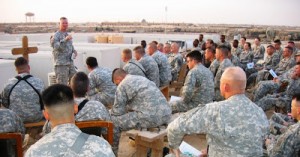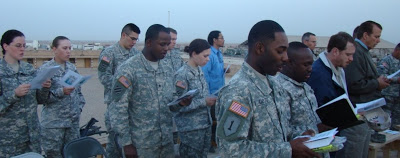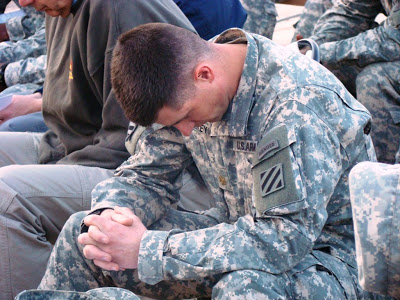While attending seminary at the Divinity School at the University of Chicago I gave careful consideration to where I would fulfill my two ministerial field studies or internships. These are required, together with three years of theological course work, for the professional, Master of Divinity degree. I was pursuing the professional ministry degree and a Ph.D. in expectation of teaching Hebrew Bible (Old Testament) at a seminary or divinity school. As a Latter-day Saint and a member of a church that takes pride in its “lay (informal) ministry”, I felt it would be helpful if I understood more about the challenges of formal ministry, the vocation to which the majority of my future students would be responding. I decided to follow the path of their professional formation. In short, I opted for  the three-year Master of Divinity over the two-year Master of Arts in Religious Studies. For my undergraduate degree from Florida Southern College, affiliated with the United Methodist Church, I majored in English, religion, and philosophy (it took me five years). My undergraduate training gave me a leg up on the majority of my fellow seminarians—academically speaking. But when it came to the field study or practical elements of my degree program, I had neither the tradition, mentors, nor the exemplars upon whom my fellow seminarians were relying. What Latter-day Saint had gone before me? From whom could I glean insight and experience? (Whenever possible, I avoided discussing my vocational plans with Latter-day Saints. The strange stares gradually wore me down.) My advisors recommended I make an arrangement with my local LDS leadership for a ministry position. My advisors were well meaning, but clearly failed to appreciate that another church calling wasn’t the experience I needed. I did explain to my bishop and stake president my designs and asked for their support as I prayerfully conducted a search for a Protestant congregation that would allow me to serve on staff as a student/assistant pastor.
the three-year Master of Divinity over the two-year Master of Arts in Religious Studies. For my undergraduate degree from Florida Southern College, affiliated with the United Methodist Church, I majored in English, religion, and philosophy (it took me five years). My undergraduate training gave me a leg up on the majority of my fellow seminarians—academically speaking. But when it came to the field study or practical elements of my degree program, I had neither the tradition, mentors, nor the exemplars upon whom my fellow seminarians were relying. What Latter-day Saint had gone before me? From whom could I glean insight and experience? (Whenever possible, I avoided discussing my vocational plans with Latter-day Saints. The strange stares gradually wore me down.) My advisors recommended I make an arrangement with my local LDS leadership for a ministry position. My advisors were well meaning, but clearly failed to appreciate that another church calling wasn’t the experience I needed. I did explain to my bishop and stake president my designs and asked for their support as I prayerfully conducted a search for a Protestant congregation that would allow me to serve on staff as a student/assistant pastor.
It was the spring of 1999, and my first attempt was a meeting with the Reverend Susan Black, Senior Pastor at Hyde Park Union; she was an American (read Northern) Baptist. She expressed her surprise at my request for an interview, and proceeded to ask me a few foundational, theological questions. My answers more than satisfied her, and although I could tell she didn’t agree with everything I had answered—nothing I said was problematic. She then directed her focus at the practical, existential aspect of what it would mean for me to serve along side her in the congregation. She was direct; “How would you feel about celebrating Communion in our community?” Now understand, I was a fairly open-minded, moderate Latter-day Saint, intellectually speaking. However, although I freely acknowledged that other denominations and traditions had truths of their own and a good deal to teach me, at the time I was still operating from a fairly traditional viewpoint of the restoration of the gospel. As I heard myself answer her question from a position that equated LDS Sacrament with Protestant Communion and too—one that relied on a narrow understanding of authority—I knew this would be a deal breaker. She forthrightly pronounced that if we couldn’t even come to the table together, she would not entertain with her parish council the possibility of me serving along side her in ministry. I told her I understood, thanked her for her time, and left broken-hearted.

I understood her position; I respected it. I began to question my own reasoning. A couple of weeks passed before my second attempt. Because it was a very similar situation, I was apprehensive. The Reverend Lynda Hawkins was Senior Pastor at the United Church of Hyde Park (notice the similarity in names—and they were only a half mile from one another); she was a United Methodist. (The United Church of Hyde Park (UCHP) is a single congregation comprised of members of The United Methodist Church, the Presbyterian Church USA, and the United Church of Christ: all mainline Protestant denominations.) To start, she asked me where else I had interviewed and what I was looking for in a field education experience. I summarized my interview with Rev. Black and explained that as a Latter-day Saint, I hadn’t had the experience of working under women leaders, and that I was specifically looking to complement my experience. I also explained that I had come to appreciate, even prefer, worship structured with the Revised Common Lectionary: a three-year, liturgical calendar-resource that helped keep the church literate of scripture in both readings, sermons, and lessons as they correspond to the life and ministry of the Savior. She engaged me on the question of Communion, and was impressed that my experience with Rev. Black was causing me to analyze and evaluate my reasoning behind my answer. (I was taking a course on practical theology at the Divinity School with Don Browning and had decided to research the similarities and differences of Sacrament and Communion to satisfy the required research for the course.) We visited for an hour, then made an appointment for the following week, allowing her to consult with her parish council and bishop. When I returned, I was pleasantly surprised that she not only welcomed me, but she emphasized that although the council hoped I would decide to join them in celebrating the Lord’s Supper, their granting me the position was not conditional of my conclusion. With the pressure off—or mostly so—I dove into my research.
One of my many resources was Phil Barlow’s Mormon’s and the Bible. I was impressed that he, a Latter-day Saint, was serving as the Chair of the Religion Department at Hanover College, affiliated with the Presbyterian Church (USA). I knew that his many years of academic service among practicing Protestants would be helpful to me in my quest for an answer on this most pressing question. I contacted Phil and explained my program of study and why I wanted to interview him. We agreed to meet, and I drove the five hours from Chicago to Hanover, IN. The visit was delightful and continues to prove helpful to me in my ministry today. He expressed his surprise but admiration for my program of study and the questions with which I wrestled. He confessed that he didn’t have answers for me, but did challenge some of my presuppositions. He asked me to consider what we Latter-day Saints mean by Sacrament? What do we understand is happening in the event? When I came to the part of my explanation that we understand we are renewing covenants—even Church membership—he stopped me. Where in scripture do we find such an explanation? When did it become a practice? His questions were historical and analytical—not judgmental. At one point during our visit, he gently chuckled at me and offered, “Nathan, you have such reverence for the written word.” Having spent years studying ancient Hebrew and Greek, I wanted to take this as a compliment—but his tone prevented me. Sometime later, I understood he wanted me to see that as beautiful and meaningful as words are, myth and symbol can also be instructive to the development of faith—even authoritative. Being overly constrained by the literal nature of words can prevent us from appreciating the richness in their various levels of meaning and application.
After analyzing scripture, the literature of the early Church Fathers, and nineteenth and twentieth century Prophets writing on the Eucharist or Communion, I prayerfully concluded that although there were commonalities between Sacrament and Communion (a least as it was celebrated at the United Church of Hyde Park) they were two very different events. When coming to the communion table of the United Church of Hyde Park, congregants were professing their faith in Christ and experiencing union in the present and future hope they have in him as Savior and Redeemer. As members of different denominations, they were not renewing membership; they were not renewing baptismal or any other type of covenants. The members understood I was Latter-day Saint and welcomed me anyway. Although some did not appreciate the differences between our traditions—most were well informed. I laid out my research and my prayerfully considered conclusion to both my bishop and stake president—each expressed his support. For the next year, I served as the Student Pastor of the United Church of Hyde Park and joined the congregation in celebrating Communion.
My service included preaching once a month, teaching the weekly Wednesday night Bible study, serving on the worship committee, and attending all parish council meetings. I’m not much of a preacher, but I am better than I was because of Lynda’s mentorship. I am, however, a gifted teacher—and teaching at UCHP helped me develop an awareness of how to choose more carefully my words and anticipate how others of various and diverse backgrounds will understand them. I was careful not to introduce teachings or doctrines that were exclusively LDS, unless I was speaking from a position of personal experience—and even then, I was always intentional about identifying them as such. It was never my intent to win converts to the LDS Church. I guess I believed that encouraging others in their relationship with (and discipleship to) Christ could only be a good thing. Sometimes when I preached, members from the Hyde Park Ward would visit. Members of UCHP would join me for Hyde Park Ward potluck dinners at the meetinghouse just up the street.

Following my internship or field study, I became an associate member of UCHP and continued to worship there with my little family on a regular basis. When Rev. Hawkins moved on, I developed a friendship with her replacement, Rev. Larry Turpin, who supported my associate membership and regular contributions. I also served as a mentor to other ministry students who were invited to complete their field study at UCHP.
My experiences celebrating the Lord’s Supper with my UCHP family did not detract from my experiences of taking the Sacrament. The two helped me better understand each other. For instance, I came to appreciate the intensely personal nature of the Sacrament. I had the sense of coming before the Lord, not so much in worship, but as one might in a personal interview—a loving experience, at least for me. Communion, on the other hand, was just that: I was not only coming together with the Lord at his table, but I was doing so with the rest of the community. We lifted our cups and broke our wafers together, in unison. We stood in a large circle around the table, looking across into one another’s eyes as we celebrated Jesus’ victory and what that means for us both in the here-and-now, as well as the hereafter. Although it took some getting used to, it never seemed wrong. In fact, after a couple of months the experience became both meaningful and beautiful.
As my experiences at UCHP turned from foreign to familiar, my second year of field study—this one outside a church—presented similar challenges. In fact, my internship with the National Conference for Community and Justice (NCCJ) was so successful, the Executive Director offered me a full-time job. I accepted and put my final year of divinity school on hold for another two years, while serving as the Director of Interfaith Programs and Planning. NCCJ is a national human relations organization confronting bias, bigotry, and racism. It was formerly the National Conference of Christians and Jews and challenged anti-Semitic and anti-Catholic attitudes, but had changed its name and broadened its scope as the United States became more religiously and racially diverse. Like UCHP, my ministry at NCCJ frequently forced me to re-evaluate my presuppositions at play in discovering how I am to relate to others. I met with senior leaders and their congregants across the spectrum of religions practiced in the United States. Nearly every day I met with leaders in their various houses of worship. It gradually occurred to me that the Lord’s will for my life was in conflict with my desire for ease and comfort. The Comforter frequently called me outside my comfort zone. For the past ten years I have served as an Army Chaplain; twenty-seven months of that time was ministering to Soldiers and Marines in combat. I’ve discovered growth sometimes requires one to give up what is good for that which is better, and this can be uncomfortable, even painful.
To be very clear, I am neither a Universalist nor a Relativist. I believe good and evil exist in both moral and religious realms. I do not believe all religions are of equal value to their adherents. I believe it disingenuous (and fear-motivated) for people of various faiths to come together and pretend that they agree on everything. Our differences matter—and we should own them, discuss them (as appropriate), and even re-evaluate them as needed. Since living my religion requires I be in relationship with others—both those within and without my tradition—I must ensure the criteria by which I choose to include and exclude others correspond with my values, my convictions. In only a few instances have I taken Communion in other congregations. In each instance I have understood what it means to the community; I have ensured the pastor knows I am Latter-day Saint, and I have been invited to do so. Because of the confusion taking Communion could cause in a highly-transitory military community, I have followed the instructions of my Church Leaders and not participated in Communion in my capacity as an Army Chaplain. (Although in a few instances the shortage of chaplains made it necessary for me to officiate at worship services where congregational leaders have read the words of blessing found in scripture.) Taking the time to clearly identify my values, better understand others’ intentions in worship, and develop criteria by which I can decide to what extent I can authentically participate in worship with my brothers and sisters of other denominations and religions has led me to more richly live the command: “Love your neighbor





Excellent. Nathan’s story serves as a great reference that Latter-day Saints can remain faithful to their LDS identity while stretching out and entering into dialogue and worship with our sisters and brothers of other faiths rather than reducing them to caricatures or stereotypes. Thanks for sharing your story!
Nathan Kline is “The Man”. That is pretty much all I can say. I’ve heard him on Jared Anderson’s “Mormon Stories Sunday School Podcast” and I’ve always been impressed with him. This is simply awesome!
This is beautiful. I think I will be sharing it, from time to time.